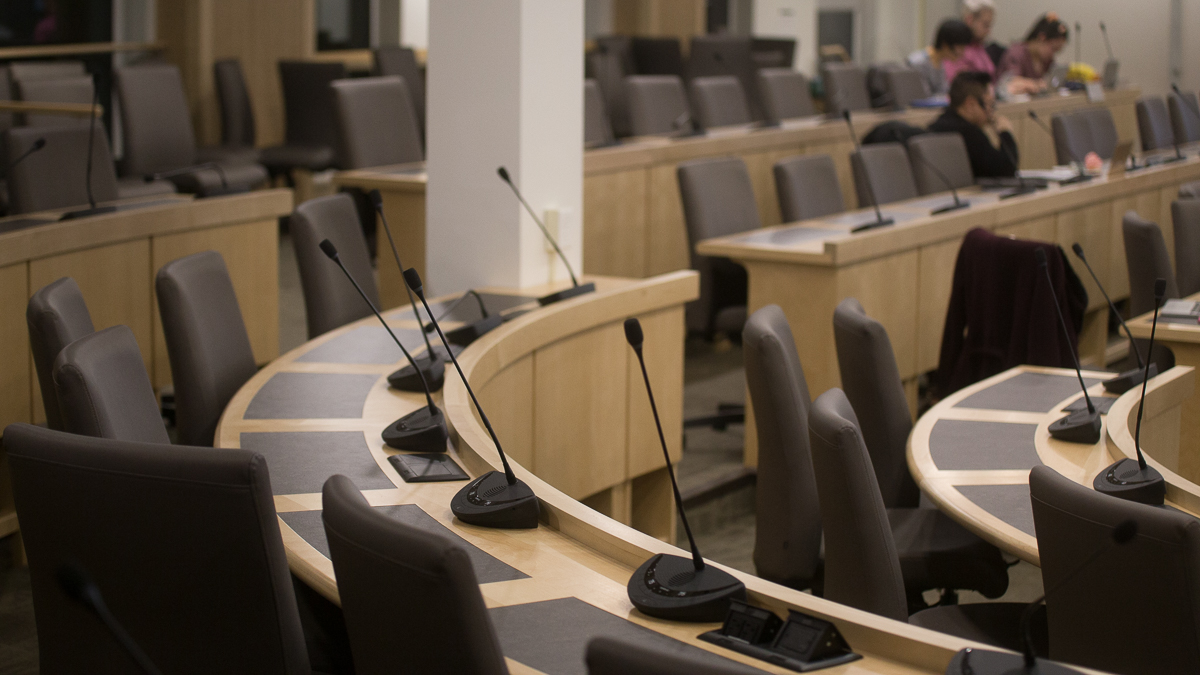Notes from Council: BarBurrito to finally open, SU fundraising, and council seat vacancies
BarBarrito to finally open, SU vice-president can now fundraise and concerns about vacancies on Council — read about all this in the November 5 Students' Council recap
 Rosty Soroka
Rosty Soroka“Notes from Council” is The Gateway’s ongoing series of recaps of noteworthy items from Students’ Council meetings
BarBurrito finally set to open
BarBurrito, the Konz replacement, will officially open its SUB location by the end of this week.
The establishment was set to open in September, but due to struggles setting up, delayed their opening till mid-October. Now, according to Students’ Union vice-president (operations and finance) Luke Statt, BarBurrito should open by the end of the first week of November.
This year’s Students’ Union handbook included a whole page of BarBurrito coupons that were set to expire by the end of October. However, due to the delay in opening, Statt said the company will now accept the coupons until December 15.
SU vice-president (external) can now fundraise
Future Students’ Union vice-presidents (external) will now take fundraising under their wing.
During the November 5 meeting, Council unanimously passed Bill 5, a legislative bill that would allow the vice-president (external) to seek revenue through external funds such as receiving donations.
“I’m really excited to see the direction this will go,” current Students’ Union vice-president (external) Adam Brown said. “My goal this year was to lay the base for future years of vice-president externals… We are trailblazing here because no other SU is doing what we’re doing.”
Brown hopes that this addition to the vice-president (external) portfolio will encourage more students to run for the position.
“This position is very politically heavy, I know that’s not always appealing to people,” Brown said. “I hope this adds a little something extra into it that is not as political.”
Engineering councillor Amlan Bose asked if this money will go exclusively to the Students’ Union, or if the money will also be channelled into student scholarships.
Brown said that fundraised money could go to three areas: the Student Involvement Endowment Fund, which provides money for student awards, Students’ Union infrastructure and capital plan projects, and various services. According to Brown, the Students’ Union has already received a donation that will be used to create an Indigenous leaders program.
“If you won’t do something about it, I will”
Students’ Union president Akanksha Bhatnagar brought up her frustrations that Council still contains nine vacant councillor positions, with faculties such as law and pharmacy having no councillors.
“We only have about six months left in our council terms and there are a lot of vacancies that I was really hoping nominating committee would fill,” Bhatnagar said.
Bhatnagar asked Yiming Chen, arts councillor and chair of the Students’ Council nominating committee responsible for recruiting new students, what steps the committee can take to recruit students from underrepresented faculties.
Chen acknowledged that there are several vacancies, but said part of this is due to systemic barriers, such as science councillors needing 495 signatures of support from students to apply. She also said it’s the nature of some faculties, such as pharmacy, to lack engagement with Student’s Council.
She added that nominating committee has posted the vacant positions on Job Kin and sent out emails to students. She also suggested councillors ask their friends to join Council.
Education councillor Katie Kidd pointed out the unfairness in the vast difference in signatures required for different faculty councillors, and said that if it continues to be unaddressed, she would take the problems into her own hands.
“It doesn’t seem fair to people that the numbers [of signatures] are so high and if you won’t do something about it, I will,” she said addressing Chen.
In response, Chen said that changing the number of signatures required wouldn’t be fair to current councillors who already faced these barriers to get elected.
“It’s not quite fair for the students who are already in council because they already faced those barriers and overcame those difficulties,” Chen said. “It’s not fair to make it easier for others to get to these positions.”
First Transition Year Program Councillor
Recently in by-elections, students elected open studies councillor Charles Blondin, making him the first Transition Year Program student to serve on Council.
The Transition Year Program (TYP) is a form of open studies that is geared towards Indigenous students who, for various reasons, cannot currently meet admission requirements. To Blondin, the program helps soften the shock of university, which is often amplified for Indigenous students.
“It’s a big challenge, especially for Indigenous students, to come to a place like this,” Blondin said.
For Blondin, TYP continues to provide him with the support he needs to navigate the transition from a territory of 43,000 people total and a community of over 1,200 people, to a campus of 40,061 students — an experience he finds echoed by many other Indigenous students.
“I really think the Transition Year Program is such a big help for Indigenous students, especially because we’re coming from such a different place in society and it’s nice to have that community,” he said. “I couldn’t imagine all of us being in faculty without that program.”
“The reason I’m so passionate about the TYP program is I wouldn’t be here, in council specifically [without it],” Blondin said. “I have so much support from the Transition Year Program and First Peoples’ House that I am able to take on additional roles and be a leader for my peers.”
CORRECTION: An earlier version of this article incorrectly stated the population of Councillor Blondin’s home community. The numbers have since been corrected. The Gateway regrets the error.




